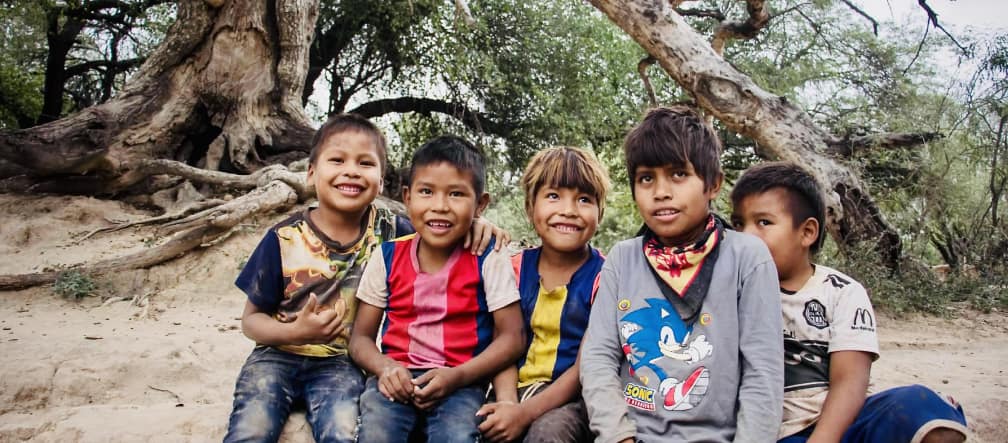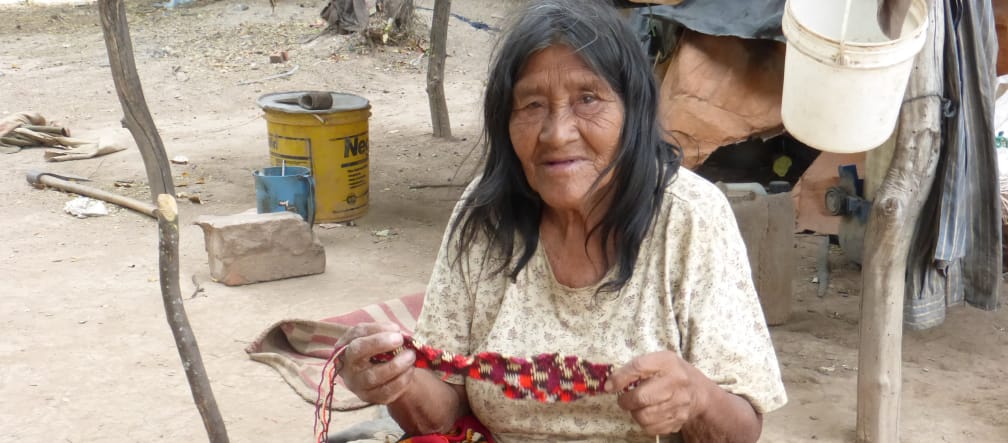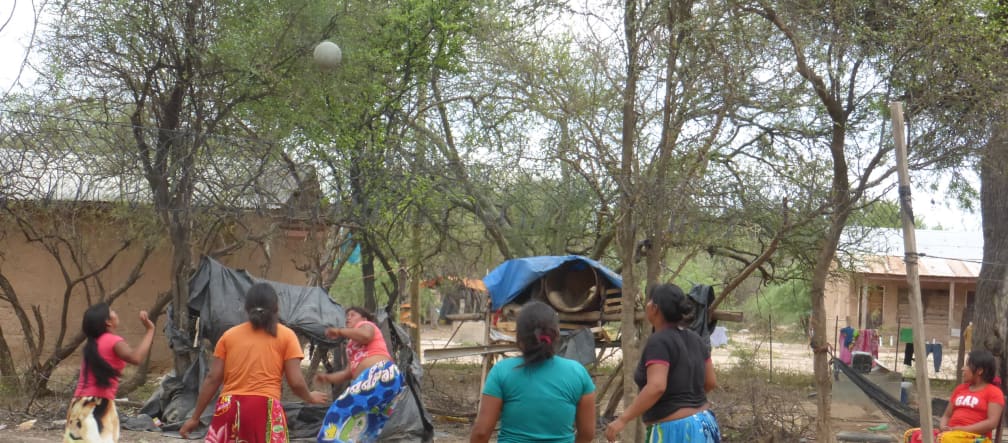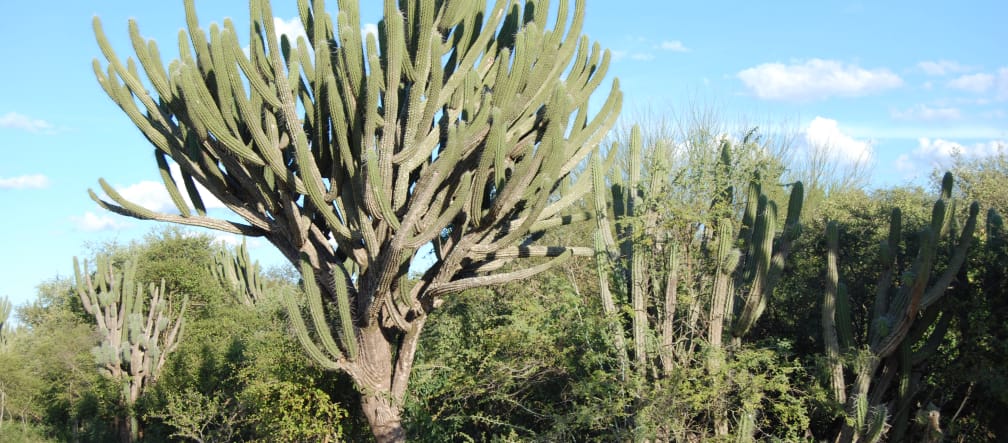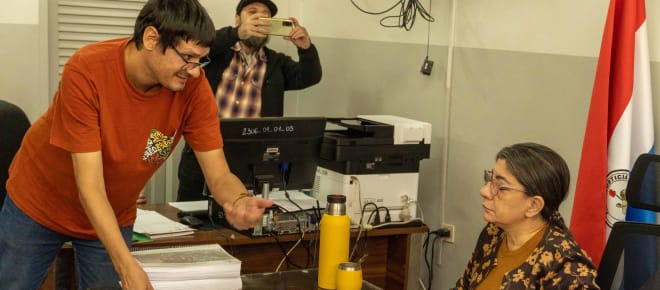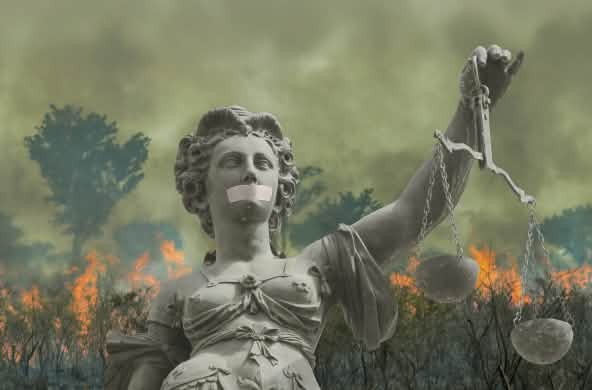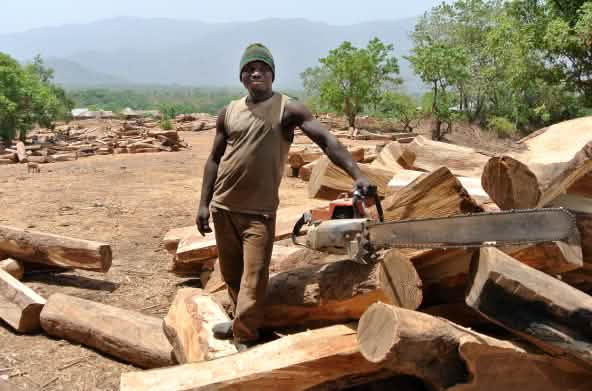Completed campaign
Paraguay: give the Manjui people their land NOW!
The petition was submitted to the relevant authority on September 15, 2023, with more than 104,000 signatures. Tierra Libre and Rainforest Rescue continue working to secure recognition of the territories of the Indigenous peoples of the Pilcomayo.
The Manjui people of the Chaco region of Paraguay are experiencing a silent ethnic cleansing: Their ancestral lands are being grabbed and its forest cleared by beef and charcoal producers. While the government acquired part of the land for the Manjui in 1998, it was never put in their name.
News and updatesTo: the President of the Instituto Paraguayo del Indígena INDI (Paraguayan Institute for Indigenous People, INDI)
“We demand the return of the ancestral lands of the indigenous Manjui people in the Chaco of Paraguay: hand over the land reserved for them immediately!”The Chaco is home to vast biodiversity and numerous indigenous peoples, including the Manjui. Extending across parts of Paraguay, Bolivia and Argentina, the ecoregion is characterized by tropical dry forests and savannas. It is the second largest old-growth forest area in Latin America.
The Paraguayan part of the Chaco was not colonized until the 20th century. Today, the Chaco is being targeted by the beef, soy and charcoal industries: Not only are they clearing the forest, but also grabbing the land of the indigenous people living there and destroying their livelihoods.
The population of the Manjui people of Paraguay has dwindled to only around 900, putting them in great danger of disappearing as an ethnic group along with their culture and language. The threats they face include demographic pressure due to lack of land, extreme poverty and decades of high infant mortality that threatens to wipe them out as a people.
The Manjui are receiving no support whatsoever from Paraguay's government institutions: For the past 23 years, they have been waiting for the handover of 38,406 hectares of land that the National Institute for Indigenous People (INDI) had acquired for them.
They are also subject to an aggressive "family planning" policy by the Ministry of Health aimed at birth control. But in this ethnic context, it amounts to genocide, according to the NGO Tierra Libre.
"Historically and structurally, Paraguayan government policy in the Chaco has been geared toward the disappearance of this people. The Institute for Indigenous People (INDI), the public institution responsible for their welfare, is playing a key role in this policy of genocide and silent ethnic cleansing," Tierra Libre stated.
Please support our petition to INDI in Paraguay calling for the immediate release of the land reserved for the Manjui people.
The silent ethnic cleansing of the Manjui people
The Manjui people are an ethnic group belonging to the Mataguayo language family. Traditionally, they made a living by hunting, fishing, gathering herbs and fruits, and small-scale farming. During the Chaco War, the Manjui people suffered under the intervention of the Bolivian army. Today, the neglect of the Paraguayan government is a major threat.
The ancestral lands of the Manjui people are located in the Alto Pilcomayo and northwest of the Central Chaco, in the department of Boquerón, in the Chaco of Paraguay. People currently live in three communities: Wonta-Santa Rosa, Comunidad Manjui de San Agustín (around Pedro P. Peña) and in the urban landless community of Abizais (at the entrance to Picada 500 in Mariscal Estigarribia). In addition, there are small groups of Manjui in various communities of the Nivaĉle people.
Details of this case, which were provided by Tierra Libre, are covered below.
The Manjui's struggle with the Paraguayan government over land
Since the beginning of the cooperative relationship between the Manjui people and the NGO Tierra Libre in 2015, more than 12,000 hectares have been titled in favor of the indigenous community of Wonta-Santa Rosa after three years of joint efforts. This land area was reclaimed thanks to the work of NGOs and a private land donation from a church organization.
The grave situation in which the Manjui people find themselves is related to a 38,406-hectare plot of land. The government-run Institute for Indigenous People (INDI) acquired the land in 1998 with a commitment to transfer it to the indigenous community of Wonta-Santa Rosa, where most of the Manjui people live. INDI has not transferred the land to date and is also complicit in the invasion of neighboring land and the illegal settlement of a charcoal company. This is compounded by INDI's inaction in the face of an irregular and illegal attempt at land appropriation (usucapión) by non-indigenous actors.
Acquisition of land by a public entity without transfer to the beneficiaries: the case of the indigenous community of Wonta-Santa Rosa
In 1998, INDI acquired an area of 38,406 hectares in the Chaco, Mariscal Estigarribia district in the department of Boquerón. The acquisition and subsequent transfer of the 38,406 hectares of land by INDI was solely to benefit the indigenous community of Wonta-Santa Rosa, as the deed of transfer explicitly states. However, the transfer never took place and the process has been marred by irregularities and alleged crimes involving multiple government entities.
Tierra Libre: INDI and other government institutions are accomplices in crimes against the Wonta-Santa Rosa community
In the data provided by the National Cadastral Service (Servicio Nacional de Catastro, SNC), a Ms. Alice Muwo Vda. de Benin is listed as the owner of the land. Access to the relevant register is blocked in the public information system by order of SNC.
The report on the ownership structure of the General Directorate of Public Property Registries (Dirección General de los Registros Públicos de la Propiedad) states: "Procedures for the establishment of the registration should be initiated in accordance with Articles 112 to 117"; the land is therefore considered unregistered. Although the Cadastral Office (SNC) has evidence – which it submitted in a report to the Public Prosecutor – that the land was sold to INDI in 1998, the report states that the corresponding entry in the register of the General Directorate of Public Property Registers does not exist.
This means that the registration has disappeared and that the title holder (INDI) must submit the original title for re-registration. This is crucial for the property interests of the Wonta-Santa Rosa community, since the purchase of the land in question was linked to INDI's obligation to transfer it to the indigenous community.
Tierra Libre then filed a complaint with the public prosecutor's office, which sent an injunction requesting INDI and other institutions involved to submit documents on these circumstances. But to date, INDI is the only institution that has neither responded nor submitted any documentation, let alone encouraged the public inquiry. On the contrary, INDI has hindered the work of the public prosecutor's office from the outset.
Since INDI is the government institution for the protection and welfare of Paraguay's indigenous peoples, this situation, from Tierra Libre's perspective, sets a scandalous precedent for the extent to which this agency violates its own institutional guidelines.
Land appropriation (juicio de usucapión) proceedings against land acquired by the government through INDI
Tierra Libre has called on INDI to initiate legal proceedings to annul the ruling on land appropriation (usucapion) by non-indigenous people. According to Tierra Libre, in this judgment, false titles, documents, and deeds (including a title to the 38,406 hectares of land belonging to the former owner, Alice Muwo Vda. de Benin, who has not owned the land since 1998, the year INDI acquired the land) were presented by the non-indigenous claimants for the land in order to obtain rights to the land in this way. Tierra Libre has therefore repeatedly asked the INDI to have the judgment on the appropriation of the land in question overturned by the courts. Tierra Libre believes it is completely illegal, since in Paraguay public land cannot be privately appropriated under normal circumstances. INDI has a legal and moral obligation to protect public land on behalf of indigenous people and deed it to the indigenous community of Wonta-Santa Rosa.
The actions of the non-indigenous actors involved in illegal land appropriation are therefore presumably criminal offenses committed by an association of irregular landowners. In 2017, members of this alleged criminal organization filed land appropriation proceedings before the competent court – whose judge had since been suspended by the review committee for the indictment of judicial officers – and then obtained a corresponding verdict. The same organization also applied to the Ministry of Environment and Sustainable Development (MADES) for an environmental permit with allegedly forged documents and false content, which the Ministry approved without major difficulties. The environmental permit is thus also illegal and invalid, according to Tierra Libre. Therefore, Tierra Libre also requested INDI to file an environmental criminal complaint and take the necessary steps with the Ministry of Environment to prevent further clearing, logging and charcoal production on the 38,406 hectares of land.
In addition to a producer of charcoal, several cattle ranchers have also invaded the area, resulting in thousands of hectares being deforested and cleared. This was done with the complicity of INDI, which has effectively abandoned the land for years without on-site inspections by its officials and without filing criminal, environmental, civil or administrative charges for more than two decades.
This situation is a scandal and a disgrace to the Paraguayan government for which INDI bears full responsibility The following government institutions are involved in this situation and in the crimes and offenses allegedly committed:
- the National Cadastral Service - SNC: The land was registered in the name of INDI, but later one of the former owners, Alice Muwo Vda. de Benin, reappears as owner;
- the Head Office of Public Land Registries (Dirección General de los Registros Públicos de la Propiedad): The registry entry has disappeared;
- the Instituto Paraguayo del Indígena - INDI: This institution has been completely inactive for more than two decades regarding the protection of the land acquired for the Manjui community;
- the judicial system: The judge of Mariscal Estigarribia decided to grant land appropriation (usucapión) for 15,600 of the 38,406 hectares. This is an aberrant decision, as public lands cannot be privately appropriated;
- the Ministry of Environment and Sustainable Development - MADES: An applicant who has no valid documents was granted permission to build kilns for charcoal production on the land.
To: the President of the Instituto Paraguayo del Indígena INDI (Paraguayan Institute for Indigenous People, INDI)
We, the undersigned, demand the immediate handover of the 38,406 hectares of land (finca 8525, padrón 3186) that the Paraguayan government acquired through the Instituto Paraguayo del Indígena (INDI) in 1998 to give to the Manjui community of Wonta-Santa Rosa. Furthermore, we demand that the Manjui people be compensated for the environmental damage inflicted on this essential part of their land over the past 23 years.
We are alarmed by the vast scale of the irreparable damage caused by the exclusion of the Manjui people from their ancestral land, as well as the destruction of their territory and the resulting demographic impact. Not only the community of Wonta-Santa Rosa, but the entire Manjui people are affected by the fact that the land has not been handed over for more than two decades. The indigenous people are in danger of disappearing as an ethnic group, as they mostly live in this community.
We are extremely concerned that this situation has arisen because of serious offenses and crimes allegedly committed by officials inside and outside INDI, the responsible institution. This situation has strained the patience not only of the members of this indigenous people, but also of civil society as a whole, especially since these facts were already made public by mass media in December 2010, some 12 years after the titling of the said lands in the name of INDI. However, 11 years after these allegations were made, the institution responsible is still committing crimes and violating the territorial rights of this indigenous people.
The institution that reports to you is primarily responsible for this grave situation, since for 23 years it has obstructed the development of the culture, economy and livelihoods of this community. In all this time, this has also impacted the people's physical and mental health. INDI, as the body responsible for the welfare of indigenous people, must take immediate and comprehensive measures to stop the destructive processes that are unfolding in this traditional indigenous territory as a form of ethnic cleansing. The suffering of the Wonta-Santa Rosa community and of the Manjui people must not be prolonged.
Please inform us as soon as possible of the measures you intend to take to remedy the situation described above and the dates on which these measures will take effect.
Yours faithfully,
July 2023 – Paraguay’s Senate approved a declaration urging the executive branch to transfer land titles to the Indigenous Manjui people, whose territory has been occupied by the charcoal company Cervantes.
The declaration was issued just three months before the end of the current legislative and executive terms, following national elections in April.
The outlook is not promising, since the ruling Colorado Party will hold a majority in both chambers.
Nevertheless, to increase the pressure, we aimed to gather at least 100,000 signatures.
September 2023 – We succeeded in collecting 104,499 signatures.
On September 15, they were delivered to the responsible authority – the new director of the Paraguayan Institute of Indigenous Affairs, Marlene Ocampos, and her legal team. During the hearing, the focus was on the Institute transferring the lands without delay to the Indigenous Manjui Wonta – Santa Rosa community.
Those present at the handover included Senator Esperanza Martinez, former Senator Miguel Kencho Rodriguez, and representatives of the Coordinator for Human Rights in Paraguay (CODEHUPY).
